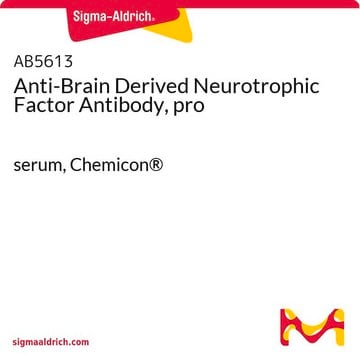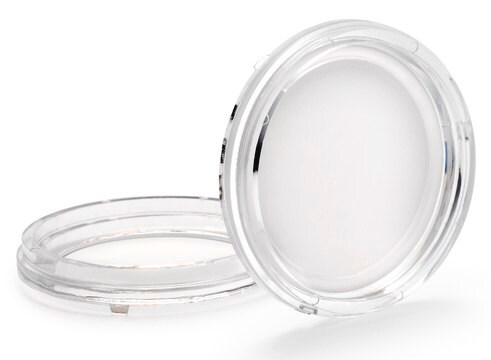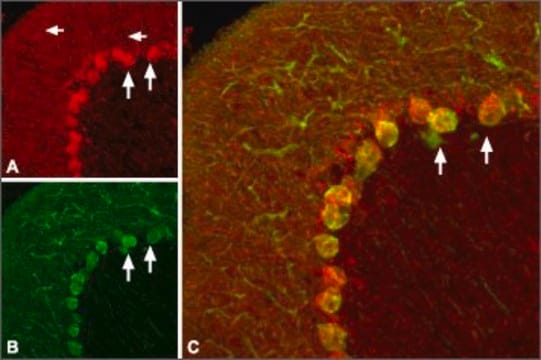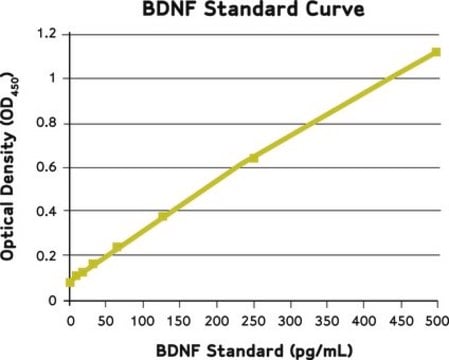AB1779
Anti-Brain Derived Neurotrophic Factor Antibody
serum, Chemicon®
Sinônimo(s):
BDNF
Faça loginpara ver os preços organizacionais e de contrato
About This Item
Código UNSPSC:
12352203
eCl@ss:
32160702
NACRES:
NA.41
Produtos recomendados
fonte biológica
rabbit
Nível de qualidade
forma do anticorpo
serum
tipo de produto de anticorpo
primary antibodies
clone
polyclonal
reatividade de espécies
human, rat
fabricante/nome comercial
Chemicon®
técnica(s)
immunohistochemistry: suitable
western blot: suitable
nº de adesão NCBI
nº de adesão UniProt
Condições de expedição
wet ice
modificação pós-traducional do alvo
unmodified
Informações sobre genes
human ... BDNF(627)
Especificidade
Brain Derived Neurotrophic Factor (BDNF). By dot blot, less than 1% cross-reactivity against NGF, NT3 or NT4.
SPECIES REACTIVITIES: Rat and human. Other species not yet tested. It is likely that the antibody will also work on mouse and porcine due to sequence homology.
SPECIES REACTIVITIES: Rat and human. Other species not yet tested. It is likely that the antibody will also work on mouse and porcine due to sequence homology.
Imunogênio
Recombinant Human Brain Derived Neurotrophic Factor (BDNF).
Aplicação
Detect Brain Derived Neurotrophic Factor using this Anti-Brain Derived Neurotrophic Factor Antibody validated for use in WB, IH.
Immunohistochemistry: 1:1,000 (see suggested protocol).
Immunoblotting:1:1,000; we recommend preparing the BDNF samples for western blot by the method of Katoh-Semba (1997) because BDNF is not easily extracted in standard buffers. Dissected tissues should be homogenized in 10 volumes of 100mM phosphate buffer containing 1mM EDTA, 2M guanidine hydrochloride (pH7.2), and three protease inhibitors, 10mM N-ethylmaleimide, 0.36mM pepstatin, and 1mM PMSF. Homogenates are then sonicated and centrifuged at 46K x g for 30 minutes at 4C.
BIOLOGICAL ACTIVITY: Neutralizes BDNF, but not other neurotrophins.
Optimal working dilutions must be determined by end user.
Immunoblotting:1:1,000; we recommend preparing the BDNF samples for western blot by the method of Katoh-Semba (1997) because BDNF is not easily extracted in standard buffers. Dissected tissues should be homogenized in 10 volumes of 100mM phosphate buffer containing 1mM EDTA, 2M guanidine hydrochloride (pH7.2), and three protease inhibitors, 10mM N-ethylmaleimide, 0.36mM pepstatin, and 1mM PMSF. Homogenates are then sonicated and centrifuged at 46K x g for 30 minutes at 4C.
BIOLOGICAL ACTIVITY: Neutralizes BDNF, but not other neurotrophins.
Optimal working dilutions must be determined by end user.
Research Category
Neuroscience
Neuroscience
Research Sub Category
Neurochemistry & Neurotrophins
Neuroinflammation & Pain
Neurochemistry & Neurotrophins
Neuroinflammation & Pain
forma física
Lyophilized, no preservatives. Reconstitute with 50 μL of sterile distilled water.
Armazenamento e estabilidade
Maintain lyophilized material at -20 to -70°C for up to 12 months. After reconstitution maintain at -20°C in undiluted aliquots for up to 6 months. Avoid repeated freeze/thaw cycles. Glycerol (1:1) can be added for additional stability.
Informações legais
CHEMICON is a registered trademark of Merck KGaA, Darmstadt, Germany
Exoneração de responsabilidade
Unless otherwise stated in our catalog or other company documentation accompanying the product(s), our products are intended for research use only and are not to be used for any other purpose, which includes but is not limited to, unauthorized commercial uses, in vitro diagnostic uses, ex vivo or in vivo therapeutic uses or any type of consumption or application to humans or animals.
Not finding the right product?
Try our Ferramenta de seleção de produtos.
recomendado
Nº do produto
Descrição
Preços
Código de classe de armazenamento
10 - Combustible liquids
Certificados de análise (COA)
Busque Certificados de análise (COA) digitando o Número do Lote do produto. Os números de lote e remessa podem ser encontrados no rótulo de um produto após a palavra “Lot” ou “Batch”.
Já possui este produto?
Encontre a documentação dos produtos que você adquiriu recentemente na biblioteca de documentos.
Ryan G Soderquist et al.
Journal of biomedical materials research. Part A, 91(3), 719-729 (2008-12-03)
Brain-derived neurotrophic factor (BDNF) was covalently attached to polyethylene glycol (PEG) in order to enhance delivery to the spinal cord via the cerebrospinal fluid (intrathecal administration). By varying reaction conditions, mixtures of BDNF covalently attached to one (primary), two (secondary)
Escalated or suppressed cocaine reward, tegmental BDNF, and accumbal dopamine caused by episodic versus continuous social stress in rats.
Miczek, KA; Nikulina, EM; Shimamoto, A; Covington, HE
The Journal of Neuroscience null
Jessica Mary Livingston-Thomas et al.
Acta pharmacologica Sinica, 34(1), 104-112 (2012-10-30)
Constraint-induced movement therapy (CIMT), which forces use of the impaired arm following unilateral stroke, promotes functional recovery in the clinic but animal models of CIMT have yielded mixed results. The aim of this study is to develop a refined endothelin-1
Fenghua Chen et al.
The international journal of neuropsychopharmacology, 21(3), 291-304 (2017-12-12)
Electroconvulsive therapy is a fast-acting and efficient treatment of depression used in the clinic. The underlying mechanism of its therapeutic effect is still unclear. However, recovery of synaptic connections and synaptic remodeling is thought to play a critical role for
Fenghua Chen et al.
The international journal of neuropsychopharmacology, 23(7), 446-458 (2020-03-28)
Electroconvulsive therapy (ECT) is a highly effective and fast-acting treatment for depression used in the clinic. Its mechanism of therapeutic action remains uncertain. Previous studies have focused on documenting neuroplasticity in the early phase following electroconvulsive seizures (ECS), an animal
Nossa equipe de cientistas tem experiência em todas as áreas de pesquisa, incluindo Life Sciences, ciência de materiais, síntese química, cromatografia, química analítica e muitas outras.
Entre em contato com a assistência técnica








